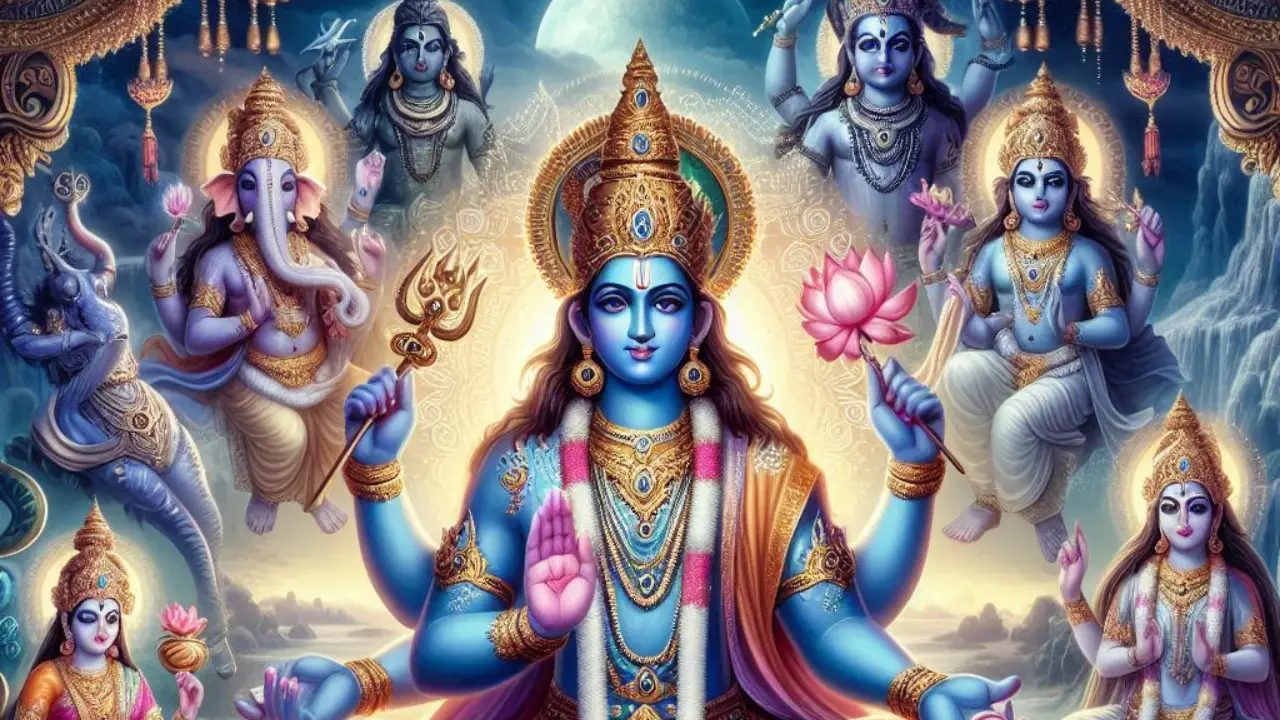The divine symphony of Hindu mythology is incomplete without the harmonious presence of Lord Vishnu. A pivotal figure in Hinduism, Lord Vishnu is known as the preserver and protector of the universe, maintaining the balance between good and evil. Let’s delve into his intricate relationships with other prominent deities in the Hindu pantheon.
Vishnu and Shiva: The Dynamic Duo
The relationship between Lord Vishnu and Shiva is fascinating and complex. Often perceived as two distinct forces, they are, in essence, two sides of the same coin. While Lord Vishnu is the preserver, Shiva is the destroyer, symbolizing the cyclical nature of the universe—creation, preservation, and destruction.
Consider the tale of the churning of the ocean, Samudra Manthan. Lord Vishnu, in his Kurma (turtle) avatar, supported Mount Mandara, preventing it from sinking, while Shiva consumed the deadly poison Halahala to save the universe. This story illustrates their collaborative efforts in maintaining cosmic balance.
Despite their contrasting roles, Lord Vishnu and Shiva share a deep mutual respect. Vishnu’s avatars, especially Rama and Krishna, often invoke Shiva’s blessings, highlighting the intertwined paths of devotion and reverence.
Lord Vishnu and Brahma: The Creator and the Preserver
Brahma, the creator of the universe, works alongside Vishnu, who preserves Brahma’s creations. Their synergy is evident in numerous myths where Lord Vishnu supports Brahma’s cosmic duties.
One popular story is the origin of the Ganges. When Bhagiratha’s penance brought Ganga to earth, her descent threatened to destroy the land. Brahma requested Vishnu’s help, and Lord Vishnu advised Bhagiratha to seek Shiva’s aid to moderate Ganga’s flow. This narrative showcases the cooperation between Brahma and Vishnu in sustaining life on earth.
Lord Vishnu and Lakshmi: The Divine Couple
Lakshmi, the goddess of wealth and prosperity, is Vishnu’s consort. Their union symbolizes the perfect balance of material and spiritual wealth. Lakshmi’s presence ensures that Vishnu’s preservation of the universe is not just in a physical sense but also in maintaining the prosperity and well-being of his devotees.
Lakshmi and Vishnu’s numerous avatars, such as Sita-Rama and Rukmini-Krishna, underscore their divine partnership. These stories emphasize that true prosperity encompasses both spiritual and material dimensions, sustained by their divine harmony.
Lord Vishnu and Indra: The Protector of the Devas
Indra, the king of gods, frequently seeks Vishnu’s assistance in maintaining order among the deities and humanity. Their relationship is one of mutual reliance, with Lord Vishnu often intervening to aid Indra in times of crisis.
During the battle between the devas and asuras, Indra was often overpowered by the asuras. Lord Vishnu, in his various avatars, such as Vamana and Krishna, played crucial roles in restoring balance and aiding Indra. These tales highlight Vishnu’s protective role and his commitment to upholding dharma.
Lord Vishnu and Krishna: The Eighth Avatar
Krishna, an avatar of Lord Vishnu, is one of the most revered and complex figures in Hindu mythology. His relationship with other deities is a reflection of Vishnu’s overarching influence.
Krishna’s interactions with the Pandavas, particularly Arjuna, in the Mahabharata, underscore his role as a divine guide. His teachings in the Bhagavad Gita provide profound spiritual insights that continue to inspire millions.
The story of Krishna lifting Govardhan Hill to protect the villagers from Indra’s wrath illustrates his protective nature. This act of divine intervention emphasizes Lord Vishnu’s commitment to safeguarding his devotees, reinforcing his role as the preserver.
Lord Vishnu and the Dashavatara: The Ten Incarnations
The concept of Dashavatara represents Vishnu’s ten principal avatars, each serving a unique purpose in maintaining cosmic order. These incarnations highlight Vishnu’s versatility and adaptability in responding to different epochs and challenges.
1. Matsya (Fish): Rescued the Vedas from the demon Hayagriva.
2. Kurma (Turtle): Supported the churning of the ocean.
3. Varaha (Boar): Saved Earth from the demon Hiranyaksha.
4. Narasimha (Man-Lion): Destroyed the demon Hiranyakashipu.
5. Vamana (Dwarf): Subdued the demon king Bali.
6. Parashurama (Warrior Priest): Eradicated corrupt Kshatriyas.
7. Rama (Prince): Defeated the demon king Ravana.
8. Krishna (Cowherd): Guided the Pandavas and taught the Bhagavad Gita.
9. Buddha (Sage): Promoted non-violence and compassion.
10. Kalki (Future Warrior): Predicted to end the current age of darkness and restore righteousness.
Each avatar’s unique story reflects Vishnu’s dedication to preserving the universe and upholding dharma, further solidifying his relationships with other deities.
Lord Vishnu and His Devotees
Vishnu’s relationship with his devotees is marked by love and devotion. Stories of his avatars interacting with devotees emphasize the personal bond they share. For instance, the story of Prahlada and Narasimha showcases Vishnu’s protective nature towards his ardent followers.
Prahlada’s unwavering devotion to Lord Vishnu, despite his father Hiranyakashipu’s opposition, is a powerful tale. Vishnu’s manifestation as Narasimha to protect Prahlada underscores the deep bond between the deity and his devotees.
Lord Vishnu’s Symbols and Attributes
Vishnu is often depicted with four attributes:
– Conch (Shankha): Represents the primordial sound of creation.
– Discus (Chakra): Symbolizes the mind and the cycle of time.
– Mace (Gada): Denotes strength and power.
– Lotus (Padma): Signifies purity and enlightenment.
These symbols reinforce Vishnu’s role as the preserver and protector of the universe.
The Eternal Guardian
The intricate relationships Lord Vishnu maintains with other deities highlight his integral role in Hindu mythology. His interactions with Shiva, Brahma, Lakshmi, Indra, and his avatars reflect the harmonious balance necessary for the universe’s sustenance. Vishnu’s tales are not just stories but profound lessons in devotion, duty, and the eternal battle between good and evil.
Reflect on Vishnu’s divine relationships and share your thoughts in the comments. How do these stories inspire you in your spiritual journey?





